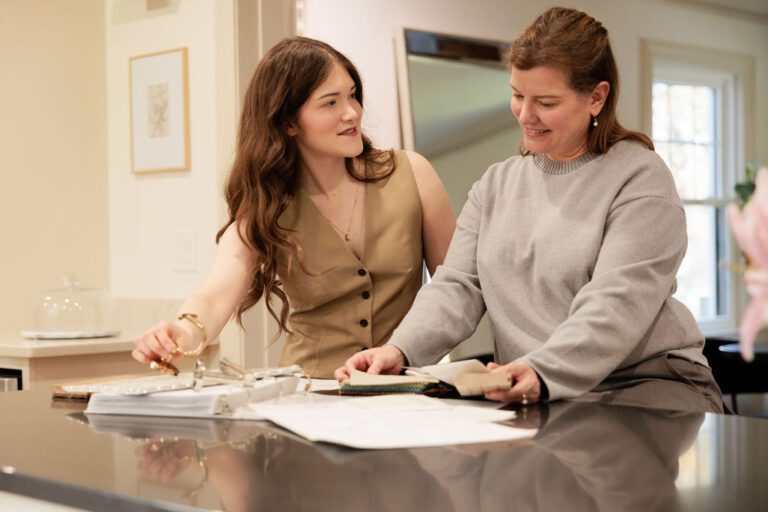First-Time Home Buyer Guide: House Shopping 101
If you’re a first-time home buyer unsure where to start, you’re not alone. I remember being in your shoes, feeling excited yet overwhelmed by the thought of finding the perfect place. It seemed like the homeowners in my life had it all figured out.

It turns out they didn’t. There are so many steps involved in buying a home, but I couldn’t find the right resources to explain them. Now that I’m on the other side, I decided to create a simple guide for first-time home buyers to follow as they go through the process.
In this three-part series, I’ll guide buyers through the essential stages of purchasing a home. From getting pre-approved for a mortgage to sealing the deal at closing, I’m covering it all!
First, we’ll focus on the journey leading up to your initial offer. Part Two (“Submitting the Offer”) and Part Three (“Surviving Closing Day”) will dive deeper into the steps that follow the offer so you know what to expect each step of the way.
Let’s get you started on the exciting path to homeownership!

Reach Out to a Mortgage Lender
If you’re interested in financing your home purchase, the first step is to contact a mortgage lender to get pre-qualified.
This step is essential because it will give you an idea of how much home you can afford. If you’re a credit union member or have a bank you’re comfortable working with, start there. Contact your financial lender of choice and ask to speak with someone about a mortgage. You’ll want to get a sense of what type of loan and interest rate you qualify for.
Getting pre-qualified is different from getting pre-approved. We’ll cover that next. When you get pre-qualified, the lender will review your financial information – income, debts, assets, etc. – and tell you how much they are willing to lend based on that information.
Pre-qualification can happen quickly, over the phone or online. No formal application or credit pull is required.
Get Your Finances in Order
Meeting with a mortgage lender can help determine what you need to do to qualify for a mortgage. A lender may advise you to pay down debt, improve your credit score, or save up for closing costs and a down payment.
The lower your debt-to-income ratio, the better your approval odds for a loan.
In general, a credit score of 620 is the minimum required for a conventional loan. There are also programs available with lower minimum credit scores, like FHA loans.
The down payment for a home purchase will range from 3% to 20%, depending on the loan type and the lender’s requirements.

Get Pre-Approved for a Mortgage
Once you review your finances and determine how much house you can afford, it’s time to get pre-approved.
Getting pre-approved is more involved than getting pre-qualified. When you get pre-approved, the lender will review your financial information, pull your credit report, and verify your employment and income.
The lender will then give you a letter that states how much they are willing to lend you. This letter is important because it gives you a budget to work with when you start shopping for homes. It also sends a message to sellers and real estate agents that you are serious about buying and that you have been vetted by a lender.
RELATED POST: The Actual Cost of Homeownership: 8 Hidden Expenses You Need to Know
Home Buyer Tip: Pre-Approval Letters
Pre-approval letters don’t last forever! Once you receive yours, check the expiration date. Most last 60-90 days, but approval periods may vary. If you need additional time beyond the expiration date, you will need to reapply with your financial lender.
Partner with a Real Estate Agent You Trust
Unless you’re experienced and comfortable with real estate contracts, I recommend partnering with a trustworthy real estate agent to purchase your home.
You’ll want someone who will be patient with you, answer all your questions, and be honest about their thoughts on the properties you’re considering. Find an agent who is familiar with your local housing market and capable of negotiating on your behalf.
Your real estate agent will be a valuable resource, both during the house-hunting season and when it comes time to write an offer and negotiate the home purchase terms.
A great place to start your search for an agent is by asking friends or family members for referrals.
Another option is to visit open houses in the neighborhoods you are interested in and talk to the agents there. I always recommend interviewing multiple agents so that you can find someone you feel comfortable working with. It might take a few conversations before you find the right fit.
Start Shopping for a Home
Now the fun begins! It’s time to start looking at homes.
There are a few ways to find homes for sale. You can drive around your desired neighborhood and look for “For Sale” signs. You can also search online on websites like Zillow, Redfin, and Trulia.
If you’ve partnered with a real estate agent, they can access the Multiple Listing Service (MLS) in your area and help you find homes that fit your criteria. Most online home sites like the ones mentioned above pull their information from the MLS, but the MLS will always have the most accurate and up-to-date information.
RELATED POST: Should I Rent or Buy? Find Out in 3 Steps
Touring Potential Homes
Once you find a few homes that you like, it’s time to see them in person.
Your real estate agent will coordinate with the sellers or listing agents to schedule the property tours. The sellers may allow only one party to view a property at a time or may choose to allow multiple showings simultaneously. You and your real estate agent will generally tour properties without the sellers present, which allows you to look around freely.

As exciting as touring potential homes can be, it’s rare to find one that checks all your boxes. Every house has unique quirks and imperfections. The best approach is to find a home that feels right and meets most of your needs.
Maybe it’s the one with the perfect backyard for entertaining guests or the one with a cozy fireplace that’s just begging to be lit on a cold winter night.
First impressions are important, but don’t let them cloud your judgment. It’s easy to get caught up in the emotion of buying a home. Step back and evaluate whether the house is a good fit for you and your family.
A balanced approach is the best approach as you try to decide on the right home for you. As Alfred Adler said famously, “Follow your heart but take your brain with you.”
Coming up next . . .
Once you’ve found the perfect home, it’s time to draft an offer to purchase the property.
Your agent will help you determine what a fair offer would be based on recent sales of similar homes in the area and will walk you through the additional terms of your offer.
More on that as well as negotiating the purchase price and the closing process in Part Two (“Submitting the Offer”) and Part Three (“Surviving Closing Day”) of this series.
This post is all about house hunting as a first-time home buyer.







